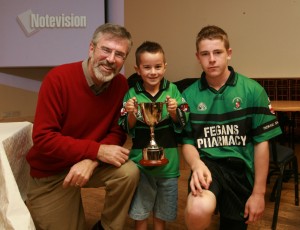Jan 19, 2011 Comments Off on How Could Brits Renege if There Was No Offer?
How Could Brits Renege if There Was No Offer?
How Could Brits Renege if There Was No Offer?
Letter in the Irish News and Andersonstown News
Gerard Foster
Danny Morrison in a recent article in another publication, un-prompted, wrote about the Hunger Strikes of 1980 and 81. He stated that he, and the Provisional leadership on the outside, was economical with the truth about the ending of the first Hunger Strike.
In fact, over the last 30 years they have stuck rigidly to the same story: Britain reneged on a deal when the Hunger Strikers ended the protest. Even when Richard O Rawe wrote that there was a deal/offer to end the second Hunger Strike, they, the Provisional leadership, said because the Brits reneged on the deal on the first Hunger Strike, they needed guarantees before the prisoners would end the second Hunger Strike.
Now Morrison is saying that there was no offer/deal during the ending of the first Hunger Strike. This does not add up. They could not end the second Hunger Strike because the Brits reneged on a deal they never made during the first Hunger Strike? What is it Danny, was there a deal or not during the first Strike?
I can only think that the Provisionals, in the run up to the next elections, are going to use the Hunger Strikers that died in 1981 as an election tool, it is on the 30th anniversary of Bobby Sands death, this is to try and increase their support. This might also be the reason they picked Pat Sheehan, a Hunger Striker, to replace Adams in West Belfast.
Before they do that, maybe there are some questions they need to answer around the lead up to Joe Mc Donnell’s death.
The one I have already asked: if the Brits didn’t make an offer in 1980, how did they renege?
Why has it taken 30 years for Morrison to tell the “truth”?
Where are the rest of the “Mountain climber” comms that were not to be seen in the book Ten Men Dead?
Adams was on the phone to his British contact when Joe died; where are the transcripts of these talks, who was he talking to (according to the Mountain climber, Brendan Duddy, he has never spoken to Adams), and what deal/offer was on the table from the British government?
None of the surviving Hunger Strikers who to spoke to Morrison or Adams during their visits to the prison hospital in July 1981 have said that either man had told them what was on offer from the British. In actual fact, Hunger Striker Lawrence Mc Keown, in his book Nor Meekly Serve My Time, wrote of the Adams visit, “he told the parents of Kieran Doherty and the Hunger Strikers that there was nothing on the table”*. It is obvious that Adams did not tell the Hunger strikers about his secret contact with the British government. Why not?
Danny Morrison, and others in the Provisional leadership, has been biggest critics of O Rawe and his claims that a Brit offer had been accepted by the prison leadership in the days before Joe Mc Donnell died. They ask repeatedly; why did it take him 25 years to say this? Well, I now ask Danny Morrison this question: why has it taken you 30 years to tell us that there was no offer/deal at the end of the first Hunger Strike?
First published in the letters page of the Irish News and the Andersonstown News
* Page 236, Nor Meekly Serve My Time, Laurence McKeown describes Gerry Adams’ 29 July visit to the hunger strikers:
“On their way out of his cell Doc’s parents met and spoke with Gerry, Bik and the others. They asked what the situation was and Gerry said he had just told all the stailceoiri, including Kieran, that there was no deal on the table from the Brits, no movement of any sort and if the stalic continued, Doc would most likely be dead within a few days. They just listened and nodded, more or less resigned to the fact that they would be watching their son die any day now.”
 Joe McDonnell’s grandson Caolan presents the Joe McDonnell Cup to Captain Gary Lennon of Sarsfields
Joe McDonnell’s grandson Caolan presents the Joe McDonnell Cup to Captain Gary Lennon of Sarsfields It has withstood the blows of a million years, and will do so to the end.
It has withstood the blows of a million years, and will do so to the end.